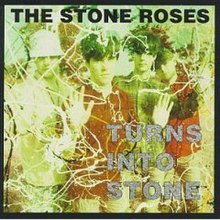This article needs additional citations for verification. (June 2009) |
| Turns into Stone | ||||
|---|---|---|---|---|
 | ||||
| Compilation album by | ||||
| Released | 20 July 1992 | |||
| Recorded | 1988–1990 | |||
| Genre | Madchester[1] | |||
| Length | 53:48 | |||
| Label | Silvertone | |||
| Producer | John Leckie, Peter Hook | |||
| The Stone Roses chronology | ||||
| ||||
| Review scores | |
|---|---|
| Source | Rating |
| Allmusic | |
| The Encyclopedia of Popular Music | |
| Uncut | |
Turns into Stone is a compilation album by English rock band The Stone Roses, released in 1992. It consists of early singles and B-sides that did not feature on their self-titled debut album. The compilation reached number 32 on the UK album chart.
The album's release was surrounded by controversy[citation needed], as the Roses were in the middle of a legal battle with their then-record label, Silvertone. An injunction prevented the band from releasing any new material for several years afterward, during which Silvertone re-released many singles, including two separate versions of "Fools Gold", and releasing stand-alone singles from the first album that were not intended to be singles (such as the edited version of "I Am the Resurrection" featuring a drum machine instead of Reni's distinctive drumming).
Despite this, the album is seen in a positive light by Roses fans because it collects the extended versions of many of their best-known non-album songs onto one CD, before a best-of compilation was even available.
The title of the album is taken from the final lines of One Love: "What goes up must come down/Turns into dust or turns into stone".
In August 2009 the album's tracks were remastered by John Leckie and included as "The B-sides" on the 20th anniversary collectors edition re-release of The Stone Roses self-titled debut album and the remastered album went on to be released separately in September 2012 by Sony Music.
- ^ "Explore: Madchester (Top Albums)". Allmusic. Retrieved 8 May 2011.
- ^ Allmusic review
- ^ Larkin, Colin (2007). The Encyclopedia of Popular Music (4th ed.). Oxford University Press. ISBN 978-0195313734.
- ^ Bonner, Michael (February 1998). "Made of Stone: The Stone Roses Discography". Uncut. No. 9. p. 60.